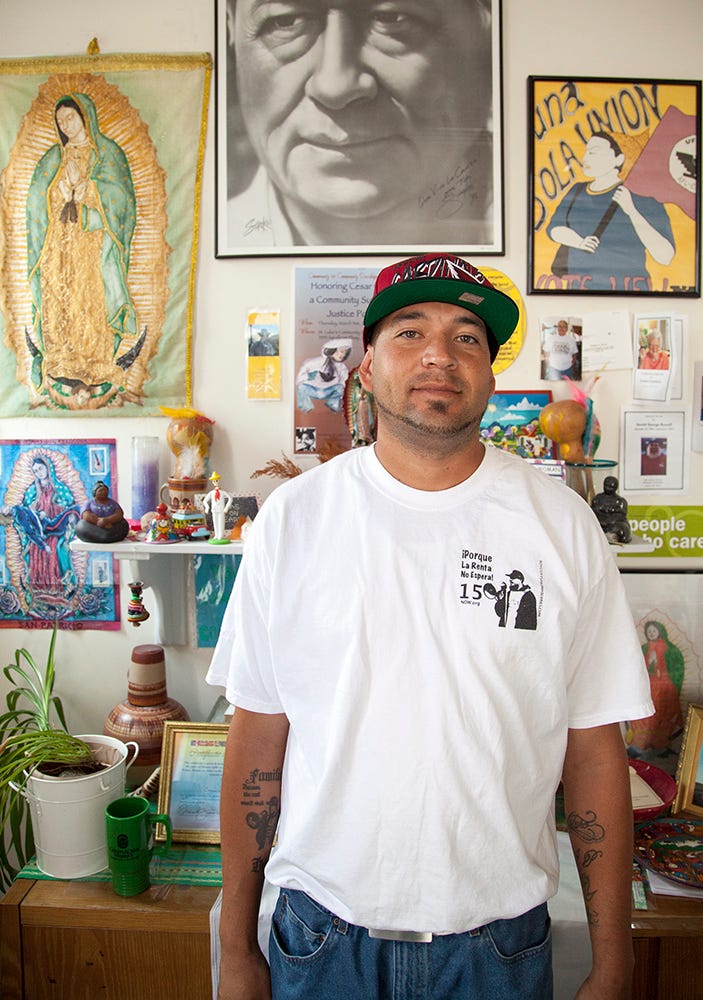A Feud in the Field
Sakuma Bros. Farms and the future of migrant workers
STORY BY MIKAYLA RALEY
photos by Annmarie Kent & Mikayla Raley
More than 2,500 miles from where he was born, Ramon Torres sits alongside his co-workers in Skagit Superior Court. The workers wait to testify against their employer, Sakuma Bros. Farms. They sit silently waiting for their turn to speak, some holding children in their arms. A toddler’s small plaid shoes dangle off the end of a bench; his sleeping body is sprawled on the wood surface. These are the families of Familias Unidas por la Justicia.
Torres is the president of Familias, a labor committee made up of 468 migrant farmworkers. During summer months, the workers harvest berries at Sakuma Bros. Farms in Burlington. Familias was created when more than 200 workers went on strike in July 2013.
Torres stands taller than most and is broad-shouldered. Beneath his T-shirt sleeves black-ink tattoos emerge. A soft-spoken 29-year-old, he was elected by his co-workers to be the group’s spokesperson. He is now the face of an $850,000 labor settlement between Sakuma Bros. Farms and Familias.
Although the story of Familias and Sakuma has made big headlines this past year, it represents just one instance of farmworkers feeling pushed to their limits.
In April 2014, the Pacific region of Washington and Oregon employed 54,000 agricultural service workers and the average wage for field workers was $11.45 per hour, according to a report on farm labor by the National Agricultural Statistics Service.
Washington State’s food and agriculture industry has a total output of $49 billion, says Mike Louisell, public information officer for the Washington State Department of Agriculture.
“Farmworkers in Washington State are the poorest [workers] in the state. That imbalance has got to change. We have got to, as farmworkers, be sharing in the profit we are helping to create,” says Rosalinda Guillen, executive director for Community to Community, a social justice group partnered with Familias.
Guillen has been with Familias since its creation. She was asked by the workers to be a witness. The daughter of a professional farmworker, Guillen worked on the fields from ages 10 to 24.

Over the past year, Familias and Community to Community have worked together to enact change at Sakuma Bros. Farms. The group went on strike for the first time on July 12, 2013, calling for better working conditions, an increase in wages and the reinstatement of fired worker Federico Lopez, according to a plaintiff’s complaint filed in Skagit County Superior Court.
If the farmworkers continue the boycott however, the question may be how much longer Sakuma can stay in business?
“The reality is, we’ve got to harvest our crops and they’ve got to make a living,” says Steve Sakuma, co-owner of Sakuma Bros. Farms. “Somewhere in between there is the answer. Without each other, neither of us are satisfied.”
While Torres and the workers risked their employment by striking, Guillen says they had reached a breaking point.
“They said, ‘We don’t care if we get fired, we know we need our jobs but there’s just so much indignity that we can take,’” Guillen says.
Torres saw workers humiliated by supervisors during the 2012 season, he says.
“The supervisors would give them nicknames. They’d call them donkeys, monkeys, dogs and [say] that they’re the only ones that should be doing this kind of work because they are so short they are stuck to the earth anyway,” Torres says.
That is not the way they treat people at the farm, Sakuma says.
“Our supervisors now and in the past are not perfect,” Sakuma says. “I don’t think they’re perfect anywhere. Could they have said something like that? Potentially. Do I know if they did or not? No.”
Guillen believes the situation with Sakuma Bros. Farms is just one instance of farmworker injustice. She sees the same issue reoccurring throughout history.
“The agricultural industry, consciously or unconsciously really wants slaves, and we are the closest or the latest group being exploited in this country,” Guillen says.
Sakuma’s family has owned and worked on their farm for four generations. He’s observed something else.
“Do the majority of farmers abuse their people and treat them like slaves? Absolutely not,” Sakuma says. “I grew up with a migrant work force. I lived with them. I ate with them. I went to school with them. So I get it, and I’m no better than they are.”
Torres and the farmworkers created Familias Unidas por la Justicia to raise their voices about their limits. They work as a group to achieve their goals. He sees the events of the last year as providing an example for other workers.
“I think that it will only encourage more people to fight for their rights, because with these wins they see that there is justice,” Torres says.
Where the conflict stands, three paths present themselves: Sakuma Bros. Farms outlasts the boycott, Familias demands are met or the berry baskets remain empty. Each choice begs the question; what will be the future of this multi-billion dollar industry?